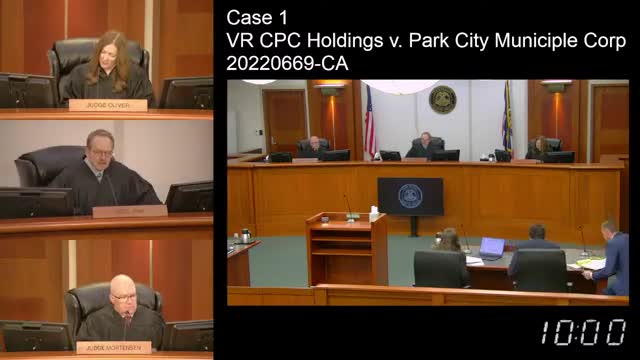Utah Court of Appeals hears challenge over Park City Mountain lift permit, scope of appeal and parking analysis at issue
Get AI-powered insights, summaries, and transcripts
Subscribe
Summary
In oral argument, attorneys for VRCPC Holdings d/b/a Park City Mountain and Park City Municipal Corporation disputed whether the planning director had authority to issue an administrative conditional use permit and whether the planning commission properly relied on parking mitigation and CCC calculations in denying the permit.
The Utah Court of Appeals heard oral argument in VRCPC Holdings, doing business as Park City Mountain, v. Park City Municipal Corporation over whether Park City’s planning director had authority to issue an administrative conditional use permit for lift upgrades and whether the planning commission’s decision should be upheld.
Ryan Cook, attorney for appellant VRCPC Holdings d/b/a Park City Mountain, told the panel that the planning director and staff spent months vetting the application and that both the applicant’s and city experts concluded the proposed lift upgrades would produce no meaningful increase in parking demand. “There was no non‑speculative evidence of a link between CCC and parking increase,” Cook said, arguing the only evidence in the record was that there was no parking impact and that any mitigation plan therefore addressed a zero incremental impact.
Cook told the court the dispute turns first on scope of appeal and fair notice: he said the petition filed to the planning commission focused on the governing standard (peak ski day versus commuter/conditional‑capacity calculations, “CCCs”), and that Park City Mountain was deprived of a meaningful opportunity to respond when the commission and parties shifted to detailed CCC calculations during the hearing. Cook stressed that under the Land Management Code (LMC) and the development agreement at issue the appellant bore the burden on appeal to show the planning director erred.
Laura Swenson, counsel for Park City Municipal Corporation, countered that the contested points — lift alignments, CCCs, and the parking mitigation plan — were raised and litigated in written filings and in two hearings before the commission. Swenson said the contested contractual criteria that trigger the administrative CUP are contained in a 1998 development agreement between the city and Park City Mountain; those six criteria are contractual preconditions for the expedited administrative process. She argued that, because the planning director lacked authority when the criteria were not met, the city and interveners properly sought review by the planning commission and that alternative grounds supporting the district court’s judgment may be considered on appeal.
The panel’s questions focused on whether the district court incorrectly assumed a parking impact from the director’s request for a parking mitigation plan, how the incremental‑impact standard in the development agreement and LMC should be applied, whether Park City Mountain had a meaningful opportunity to present its evidence at the commission hearings, and what remedy an appellate court should order (affirmance, reversal on alternative grounds, or remand). Judges and counsel also discussed procedural issues including whether a cross‑appeal was required to preserve alternative grounds and the relationship between the administrative CUP process and the standard conditional use permit (CUP) process.
Counsel debated factual points appearing in the record: Park City Mountain had provided a parking mitigation plan the planning director required; both the applicant’s expert (SC Group/EcoSign referenced) and the city’s expert were cited by counsel and the district court; one party noted a figure that the prior season included 68 days of overflow parking. Cook argued the development agreement and controlling precedent limit the commission’s review to incremental impacts from the specific upgrades at issue; Swenson said the record shows alignment, CCCs and parking were addressed in submissions and at hearings and that the interveners raised overflow and adequacy concerns that justified conditions.
At the close of argument the court took the case under advisement and said it would issue a written decision at a later date. The panel allowed five minutes of rebuttal for the appellant and indicated it would supply a written opinion rather than issuing a decision from the bench.
The dispute centers on how to apply the 1998 development agreement’s six criteria for the administrative CUP, what issues were preserved and fairly noticed for appeal before the commission, and whether the commission’s reliance on the parking mitigation plan and CCC calculations was supported by substantial evidence. The outcome will determine whether Park City Mountain may proceed under the administrative CUP process for these lift upgrades or must pursue the standard CUP path that the parties agree remains available.
